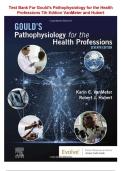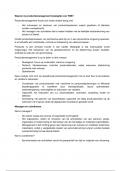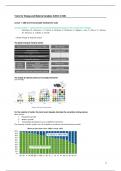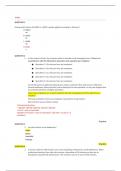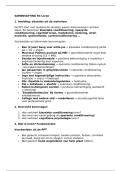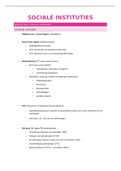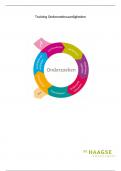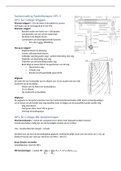1.1 What are some key principles of sustainability?
Concept 1.1A: Life on the earth has been sustained for billions of years by solar
energy, biodiversity and chemical cycling.
Concept 1.1B: Our lives and economies depend on energy from the sun and on
natural resources and ecosystem services (natural services) provided
by the earth.
Concept 1.1C: We should live more sustainably by following six principles of
sustainability.
Environmental science is a study of connections in nature
- The environment is all the (non-)living things with which you interact, such as plants, animals,
air and sunlight.
- Environmental science is an interdisciplinary study of how the earth works, how humans
interact with the environment and how we can live more sustainably.
o A key component is ecology, the interaction between living organisms and their
environment. A major focus here is ecosystems, a set of species in a defined area or
volume of air/water.
- Environmentalism and environmental activism is the social movement, where environmental
science is interested in how the environment works.
Learning from the earth: Three scientific principles of sustainability
- Dependence on solar energy, which provided us with all the energy and nutrients.
- Biodiversity is the variety of genes, species, ecosystems and ecosystem processes that we
need for a vital living earth.
- Chemical cycling is the circulation of chemicals or nutrients needed to sustain life from the
environment through various organisms and back to the environment.
- There is no waste in nature.
Key components of sustainability
- Natural capital is the natural resources and ecosystem services the earth provides.
- Natural resources are materials and energy provided by nature that are essential or useful to
humans. There are three categories:
o Inexhaustible resources such as forests and topsoil, which we should use at the
sustainable yield rate to make sure we do not overuse it.
o Nonrenewable or exhaustible resources such as fossil fuels which we need to use
only as quick as the earth can replenish it, which is essentially not at all in our
lifetimes.
- Ecosystem services are natural services provided by healthy ecosystems that support life and
human economies at no monetary cost to us. Some important aspects are:
o Nutrient cycling, which is essential for healthy ecosystems and their services which
we need to survive.
o Humans can degrade natural capital.
o We need to create solutions to the environmental problems we face because we are
in a crisis.
Three additional principles of sustainability
- Full cost pricing to make sure you actually pay for all of the harmful environmental and
health costs.
, - Win-win solutions are needed to still provide in the human needs without harming the
environment.
- We have a responsibility towards our future generations to leave the earth in at least the
same if not better state as we were born in.
Countries differ in their resource use and environmental impact
- More-developed countries use the biggest part of all the resources and have the largest
footprints.
- Less-developed countries do not have the money and resources to grow and use as much as
the more-developed countries.
1.2 How are our ecological footprints affecting the earth?
Concept 1.2A: Humans dominate the earth with the power to sustain, add to or degrade the
natural capital that supports all life and human economies.
Concept 1.2B: As our ecological footprints grow, we deplete and degrade more of the
earth’s natural capital that sustains us.
Good news: many people have a better quality of life
- Poverty has declined sharply, and the overall health systems in the world are much
improved.
We are living unsustainably
- We waste, deplete and degrade much of the earth’s life0sustaining natural capital:
environmental or natural capital degradation. We are living a life in which we are dominant
and do not think about all the natural resources on which our lives are built.
Degrading commonly shared renewable resources: the tragedy of the commons
- Shared or open access resources are degrading, the tragedy of the commons. Because they
are not regulated, they are depleted very quickly. To solve this, it could be internationally
tackled or made private where possible.
Our growing ecological footprints
- Our ecological footprint is the amount of biologically productive land and water needed to
supply a population in an area with renewable resources and to absorb and recycle the
wastes and pollution such resources use produces.
- The biocapacity is the ability of the earth’s productive ecosystems to regenerate the
renewable resources used by a population. Per person this is the per capita ecological
footprint.
- Currently we are mostly in an ecological deficit, where we use more than the available
biocapacity.
IPAT is another environmental impact model
- Impact = Population X Affluence X Technology. Also here the impact (affluence) is taken into
account but also the technology that can reduce our footprints.
China’s growing number of affluent consumers
- China’s economy is growing extremely fast and their footprints are getting bigger also
extremely fast. This is not only because of their growing population but also because their
affluence is growing quickly.
,Cultural changes can increase or shrink our ecological footprints
- The first revolution was the agricultural revolution in which we learned to grow and breed
plants and animals. This started about 10000 years ago.
- The second revolution was the industrial-medical revolution where we learned to use large-
scale production and the movement to cities. This lasted about 250 years.
- About 50 years ago the information-globalization revolution started where the gained access
to a lot of information and resources on a global scale.
- Now the sustainability revolution is starting where the earth’s health needs to be improved.
1.3 What are the environmental problems and why do they persist?
Concept 1.3A: Basic causes of environmental problems are population growth, wasteful and
unsustainable resource use, poverty, avoidance of full-cost pricing, increasing
isolation from nature and different environmental worldviews.
Concept 1.3B: Our environmental worldviews play a key role in determining whether we
live unsustainably or more sustainably.
Basic causes of environmental problems
- Population growth.
- Wasteful and unsustainable resource us.
- Poverty.
- Omission of the harmful environmental and health costs of goods and services in market
prices.
- Increasing isolation from nature.
- Competing environmental worldviews.
The human population is growing at a rapid rate
- The earth is growing exponentially: it is growing with a fixed percentage per unit of time.
Affluence and unsustainable resource use
- The world’s human population is using more and more resources per person and this is also
done unsustainable.
Poverty has harmful environmental and health effects
- Poverty is a condition in which people lack enough money to fulfill their basic needs for food,
water, shelter, health care and education.
- Poverty can result in massive unsustainable usage of environmental resources such as wood
and water. This in turn only makes it worse and a lot of people suffer from severe
malnutrition.
Prices of goods and services rarely include their harmful environmental and health costs
- Prices rarely include all if any harmful costs. This is mainly because of strong opposition from
the big companies that now are most harmful.
- Subsidies should shift to greener alternatives to stimulate a more sustainable economy which
is in the end beneficial for everyone.
People are increasingly isolated from nature
- Many people suffer from the nature-deficit disorder, where they lack the relation to nature
and do not understand what is happening to the earth. This also results in health issues such
as concentration problems and depression.
, People have different views about environmental problems and their solutions
- Your environmental worldview is your set of assumptions and values concerning how the
natural world works and how you think you should interact with the environment.
- Environmental ethics is the study of varying beliefs about what is right and wrong with how
we treat the environment, provides useful tools for examining worldviews.
- There are three major worldviews:
o A human-centered environmental worldview sees the natural world as a support
system for human life. This can be further divided into the planetary management
worldview and stewardship worldview.
o A life-centered environmental worldview, where all species have value in fulfilling
their particular role within the biosphere, regardless of their potential or actual use
to humans.
o An earth-centered worldview beliefs that we are part of and dependent on nature
and the earth’s natural capital exists for all species, not just for humans.
1.4 What is an environmentally sustainable society?
Concept 1.4: Living sustainably means living on the earth’s natural income without
depleting or degrading the natural capital that supplies it.
Protecting natural capital and living on its income
- An environmentally sustainable society protects natural capital and lives on its income. It
lives of its natural income.
We can live more sustainably
- Learning from nature.
- Protecting natural capital.
- Not wasting resources.
- Recycling and reusing nonrenewable resources.
- Incorporating the harmful health and environmental costs into the market prices.
- Preventing future environmental damage and repairing past damage.
- Cooperating with one another to find win-win situations to environmental problems we face.
- Accepting the ethical responsibility to pass the earth that sustains us on to future
generations in a condition as good or better than what we inherited.
- Change can occur very quickly and it only needs about 10% of a population, so there is hope.


